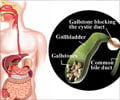Acute hepatocellular injury is a commonly encountered phenomenon in patients with cholelithiasis and concomitant common bile duct (CBD) stones.
Acute hepatocellular injury is a commonly encountered phenomenon in patients with cholelithiasis and concomitant common bile duct (CBD) stones. However, in clinical practice, it seemed to occur also in cholelithiasis patients without evidence of CBD stones. Its incidence and final outcome necessitated clarification.
A research article to be published on August 14, 2009 in the World Journal of Gastroenterology addresses this question. The research team, led by Dr. Shou-Chuan Shih from Mackay Memorial Hospital (Taiwan, China) investigated acute transient hepatocellular injury in patients with cholelithiasis and cholecystitis but no evidence of choledocholithiasis.The medical records of patients with cholelithiasis who underwent cholecystectomy between July 2003 and June 2007 were retrospectively reviewed. Imaging studies to detect CBD stones were performed in 186 patients, who constituted the study population. Biochemical liver tests before and after surgery, and with the presence or absence of CBD stones were analyzed.
They found that, in 96 patients with cholelithiasis and cholecystitis without evidence of CBD stones, 49 (51.0%) had an alanine aminotransferase level elevated to 2-3 times the upper limit of normal, and 40 (41.2%) had an elevated aspartate aminotransferase level. Similar manifestations of hepatocellular injury were, as would be expected, even more obvious in the 90 patients with CBD stones. These markers of hepatocellular injury resolved almost completely within 2 week to 1 moth after cholecystectomy. Compared to 59 patients with histologically less severe cholecystitis.
The result indicated that acute hepatocel lular injury in cholelithiasis and cholecystitis without choledocholithiasis is mild and transient. Hyperbilirubinemia and leukocytosis may predict severe inflammatory changes in the gallbladder.
Source-Eurekalert
LIN










